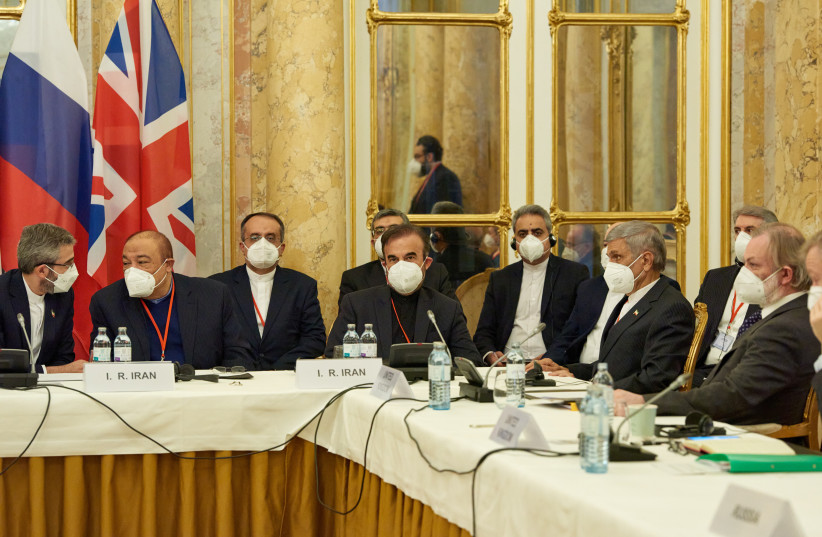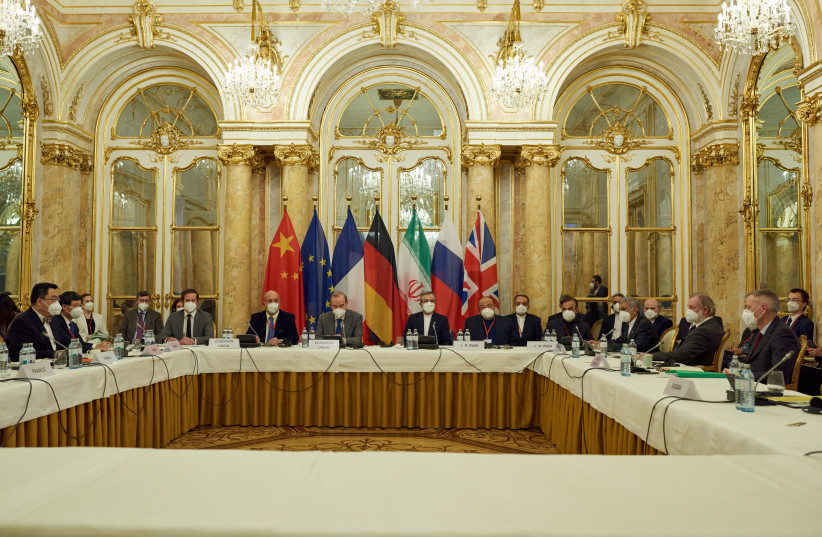SETH J. FRANTZMANPublished: DECEMBER 4, 2021 12:30
Iran’s Fars News asked on Saturday: “what is the point of the Iran and P5+1 negotiations?” Indeed, Iran’s media knows there is no point, and it appears that only Westerners think there is a real point to the endless discussions in Vienna.
The P5+1 refers to the UN Security Council’s five permanent members which include China, France, Russia, the United Kingdom and the United States, plus Germany. This includes the three European countries, of the current E3.
The basic issue in Vienna is whether the West, and particularly the US, will beg Iran not to build a nuclear weapon and provide sanctions relief in exchange for some kind of deal. It’s not clear if Iran actually can and will build a bomb, but it holds this up as blackmail to get things it wants.
cnxps.cmd.push(function () { cnxps({ playerId: ’36af7c51-0caf-4741-9824-2c941fc6c17b’ }).render(‘4c4d856e0e6f4e3d808bbc1715e132f6’); });
if(window.location.pathname.indexOf(“/jpost-tech/”)!=-1){ document.getElementsByClassName(“divConnatix”)[0].style.display =”none”; var script = document.createElement(‘script’); script.src = ‘https://static.vidazoo.com/basev/vwpt.js’; script.setAttribute(‘data-widget-id’,’616dd69d1b04080004ac2cc0′); document.getElementsByClassName(‘divVidazoo’)[0].appendChild(script); }else if(window.location.pathname.indexOf(“/israel-news/”) != -1 || window.location.pathname.indexOf(“/omg/”) != -1 || window.location.pathname.indexOf(“/food-recipes/”) != -1 || window.location.pathname.indexOf(“/science/”) != -1){ document.getElementsByClassName(“divConnatix”)[0].style.display =”none”; var script = document.createElement(‘script’); script.src = ‘https://static.vidazoo.com/basev/vwpt.js’; script.setAttribute(‘data-widget-id’,’60fd6becf6393400049e6535′); document.getElementsByClassName(‘divVidazoo’)[0].appendChild(script); }else if(window.location.pathname.indexOf(“/health-and-wellness/”) != -1){ document.getElementsByClassName(“divConnatix”)[0].style.display =”none”; var script = document.createElement(‘script’); script.src = ‘https://player.anyclip.com/anyclip-widget/lre-widget/prod/v1/src/lre.js’; script.setAttribute(‘pubname’,’jpostcom’); script.setAttribute(‘widgetname’,’0011r00001lcD1i_12246′); document.getElementsByClassName(‘divAnyClip’)[0].appendChild(script);}else if(window.location.pathname.indexOf(“/breaking-news/”) != -1){document.getElementsByClassName(“divConnatix”)[0].style.display =”none”;var script = document.createElement(‘script’); script.src = ‘https://player.anyclip.com/anyclip-widget/lre-widget/prod/v1/src/lre.js’; script.setAttribute(‘pubname’,’jpostcom’); script.setAttribute(‘widgetname’,’0011r00001lcD1i_12258′); document.getElementsByClassName(‘divAnyClip’)[0].appendChild(script);}
There is a narrative among the pro-Iran lobby in the West that tends to see US policy – of having gotten into a deal with Iran in 2015, and then leaving the deal and then going back to Vienna to talk some more – as being a failed one in which America is always at fault.
In this narrative, the US needed a deal in 2015 or there might be “war” with Iran. The deal was supposed to stop the Islamic Republic from building nuclear weapons – which it claimed it didn’t even want and wasn’t supposed to build anyway.
 Iran’s chief nuclear negotiator Ali Bagheri Kani and members of the Iranian delegation wait for the start of a meeting of the JCPOA Joint Commission in Vienna, Austria November 29, 2021. (credit: EU DELEGATION IN VIENNA/HANDOUT VIA REUTERS)
Iran’s chief nuclear negotiator Ali Bagheri Kani and members of the Iranian delegation wait for the start of a meeting of the JCPOA Joint Commission in Vienna, Austria November 29, 2021. (credit: EU DELEGATION IN VIENNA/HANDOUT VIA REUTERS)
Former US President Donald Trump left the deal. But for some, this is evidence that Washington and Tehran then came to the “brink of war” and that Iran was then forced to destabilize the Middle East through its proxies in Gaza, Lebanon, Syria, Iraq and Yemen. It therefore had a right to expand its nuclear program, since the US had left the deal.
The logical fallacy of the Iran discussions talking points is always the same. The US broke the deal. Iran wants more talks. If the talks fail then a nuclear-armed Iran will emerge and there will be war to stop that eventuality. Either a bomb or war are the only two options presented.
This becomes sort of a grift because it hinges on the theory that Iran’s leadership would actually construct a device and test it in a nuclear explosion. After all, that’s the way countries get beyond nuclear-threshold status – they have to actually build the weapon and see if it works. That is what the US did in 1945, after prevaricating since 1944. That is also what Pakistan and India have done.
So the Iran talks have so far had no progress. Fars News knows this and it reflects the regime narrative. It says that the “story goes back to the end of Mr. Rouhani’s government. Less than five months before the end of the government’s eight-year term, prudence and hope remained. There were less than two months left until the presidential election. Only the government was stoned, and negotiations with the Americans and Europeans could not save the country from economic problems.”
Fars continues: “Summing up this round of negotiations, it can be said that the main issue was the laying of the groundwork for an agreement. Iran has presented its initial plan, and now the Western parties must consult with their capitals to respond to these two documents and the proposal of the Iranian team.”
The definition of a “grift” is a form of small scale swindling. Grifters are people that swindle others, sometimes systematically over many years. There are many things in the US these days that can be described as grift, especially in political commentary.
There is no doubt that a nuclear-armed Iran is a serious threat. However the discussion about the Iran deal and the endless negotiations that go nowhere, as well as the 2015 deal itself, appear more like a grift than a serious discussion. This is because there won’t likely be a “war” with Iran, at least not a war between the US and Iran. There may be attempts to prevent Tehran from acquiring a nuclear weapon or reaching a certain level of enrichment. But the idea that is presented as “either war or a nuclear Iran” is likely a false narrative.
It’s unclear if the Islamic Republic’s partners in Russia and China would accept a nuclear Iran or want one. As such, it may continue grifting – and try to get concessions from the West while knowing it doesn’t want a real nuclear weapon.

